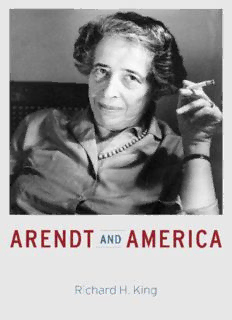
Arendt and America PDF
Preview Arendt and America
Arendt and America ARENDT AND AMERICA Richard H. King The University of Chicago Press Chicago and London Richard H. King is professor emeritus of U.S. intellectual history at the University of Nottingham, UK. He is the editor of Obama and Race: History, Culture, Politics, coeditor of Hannah Arendt and the Uses of History: Imperialism, Race, Nation, Genocide, and the author of Race, Culture, and the Intellectuals, 1940–1970, among other books. The University of Chicago Press, Chicago 60637 The University of Chicago Press, Ltd., London © 2015 by The University of Chicago All rights reserved. Published 2015. Printed in the United States of America 24 23 22 21 20 19 18 17 16 15 1 2 3 4 5 ISBN- 13: 978- 0- 226- 31149- 4 (cloth) ISBN- 13: 978- 0- 226- 31152- 4 (e- book) DOI: 10.7208/chicago/9780226311524.001.0001 Library of Congress Cataloging- in- Publication Data King, Richard H., author. Arendt and America / Richard H. King. pages cm Includes bibliographical references and index. ISBN 978- 0- 226- 31149- 4 (cloth : alk. paper) — ISBN 978- 0- 226- 31152- 4 (e- book) 1. Arendt, Hannah, 1906–1975. 2. United States—History—20th century. 3. Political scientists—Unites States—Biography. I. Title. JC251.A74K56 2015 320.5—dc22 2015011456 ♾ This paper meets the requirements of ANSI/NISO Z39.48- 1992 (Permanence of Paper). To Steve and Larry CONTENTS Introduction: Hannah Arendt’s World 1 1 Guilt and Responsibility 25 2 The Origins of Totalitarianism in America 43 3 Rediscovering the World 69 4 Arendt, Tocqueville, and Cold War America 89 5 Arendt, Riesman, and America as Mass Society 109 6 Arendt and Postwar American Thought 125 7 Reflections/Refractions of Race, 1945– 1955 145 8 Arendt, the Schools, and Civil Rights 165 9 The Eichmann Case 189 10 Against the Liberal Grain 219 11 The Revolutionary Traditions 245 12 The Crises of Arendt’s Republic 271 Conclusion— Once More: The Film, Eichmann, and Evil 297 Acknowledgments 319 Notes 325 Index 393 vii Introduction Hannah Arendt’s World At Hannah Arendt’s funeral, December 8, 1975, her friend of a half- century, philosopher Hans Jonas, reflected on the difference it made that Arendt had come to the United States. After suggesting that she had first become politicized in her Parisian exile in the 1930s, Jonas observed: “Still, what would have become of that, had she not come to these shores— who knows? It was the experience of the Republic here which decisively shaped her political thinking, tempered as it was in the fires of European tyranny and catastrophe, and forever supported by her grounding in classical thought. America taught her a way beyond the hardened alternatives of left and right from which she had escaped; and the idea of the Republic, as the realistic chance for freedom, remained dear to her even in its darkening days.”1 Cer- tainly Arendt herself believed that there was something different— and politically liberating— about the American political culture, particularly the achievement of the Framers. Jonas aptly captured it with the phrase “the idea of the Republic.” If the Republic was the great American experience that Arendt responded to, then the first of the two major themes of Arendt’s work is “beginning anew.” In the last paragraph of “Ideology and Terror,” an essay added to the second edition of The Origins of Totalitarianism (1958), she connected new beginnings with what she called “natality”: “Beginning, before it becomes a 1
Description: